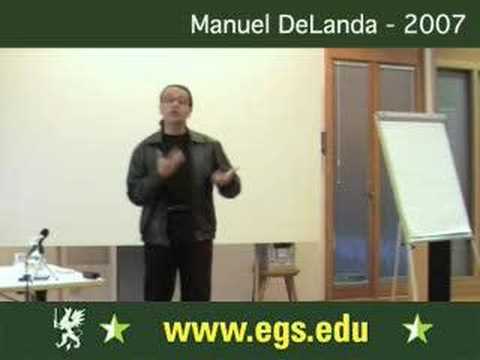European Graduate School Video Lectures
http://www.egs.edu/ Manuel DeLanda lecturing about the philosophy of Gilles Deleuze. Public Open Video Lecture at European Graduate School EGS, Media and Communication Studies department program. Saas-Fee, Switzerland 2007. Manuel De Landa. Gilles Deleuze.
Manuel DeLanda, (born 1952 in Mexico City), is a writer, artist and distinguished philosopher who has lived in New York since 1975. He is an Adjunct Associate Professor at Graduate School of Architecture, Planning and Preservation at Columbia University (New York), a Professor for Contemporary Philosophy and Science at the European Graduate School in Saas-Fee, Switzerland, a professor at the Canisius College in Buffalo, New York, and professor at the University of Pennsylvania School of Design in Philadelphia, Pennsylvania.
He is the author of War in the Age of Intelligent Machines (1991), A Thousand Years of Nonlinear History (1997), Intensive Science and Virtual Philosophy (2002) and A New Philosophy of Society: Assemblage Theory and Social Complexity (2006). He has published many articles and essays and lectured extensively in Europe and in the United States. His work focuses on the theories of the French philosopher Gilles Deleuze on one hand, and modern science, self-organizing matter, artificial life and intelligence, economics, architecture, chaos theory, history of science, nonlinear science, cellular automata on the other. De Landa became a principal figure in the “new materialism” based on his application of Deleuze’s realist ontology. His universal research into “morphogenesis” – the production of the semi-stable structures out of material flows that are constitutive of the natural and social world – has been of interest to theorists across many academic and professional disciplines.
Alongside his intellectual work, DeLanda made several short Super 8 and 16mm films in the 1970s and early 1980s, all of which are now out of circulation. Cited by filmmaker Nick Zedd in his Cinema of Transgression Manifesto, DeLanda associated with many of the experimental and art filmmakers of this New York based movement. Much of DeLanda’s film work is inspired by his interest in philosophy and critical theory; one of his best known films, Raw Nerves, has been described as a ‘Lacanian thriller’ by at least one critic.
Source



It is very important for the world to upload all this videos from EGS!!!!
I agree. That's the problem with philosophy departments in North America and elswhere. Let me tell you, my Political Science lectures where we actually study Deleuze, Derrida, Levinas (and even Badiou) are filled with philosophy students. Philosophy as a disciple has stopped being serious as a result of the emphasis given to the analytical tradition.
The humanities should be restructured in general. I cant buy in to deleuze having any explanatory power, it does seem more like art. I think he said something like art, philosophy, and science are 3 different ways to understand the world. I only see science, and some sort of "analysis" innate to humans. A bit like Russell wrote about.
Well, you obviously aren't acquainted with too many "professional philosophers, then.
But that's ok, no need to feel sad…
if you are going to try to come off as more intelligent than your imagined reader, why don't you try to use well and spell correctly the BIG words you use, or else your the reasons for your chuckle should remain…autochthonic to yourself
thank you for the comment. please read and enjoy: A Thousand Years of Nonlinear History
by Manuel De Landa. i hope this helps. thank you.
Stick-in-the-muds everywhere will tell you that Deleuze is 'not philosophy.' Of course these folks are animated by the same spirit that claimed Nietzsche wasn't philosophy, that Spinoza wasn't. These are the accountants of philosophy who, I guess, would have us all reading Russell and Frege and nothing else. Ick.
That said, DeLanda WAS more fun when he was driving the getaway car for Joe Coleman.
i am very curious as to who discounted spinoza as a philosopher.
If you're curious, check out the school of Soviet philosophers in the late 1920's who understand him not as a philosopher but as a particularly gullible theologian.
Deleuze was influenced by the artistic side of humans.
american yaqui indian philosophy
paraphrased. carlos castaneda as
continental; poisoned in a river
of come-lately discourse.
it seems to me that there's much more to be gained by simply reading the chapter from A Thousand Plateau's which he discuses then listening to someone lecture on it…
"better a fool on your own account
than a sage on another's approbation"
Crystals expressing themselves?
Why is it that somebody who is ostensibly setting out to discuss aspects of the sciences ends up sounding like a proponent of some sort of new-age "crystal healing" tripe? I mean if the majority of what we convey to each other takes the form of discourse then isn't it important to point out to these similarities in expressive style and terminological usage?
Crystals expressing themselves?
Why is it that somebody ostensibly setting out to discuss scientific ends up sounding like a proponent of some new-age "crystal healing" tripe?
I mean if the vast majority of what we convey to each other is through the use of spoken/written language then isn't it important to recognise when certain expressive and terminological methods overlap?
Crystals expressing themselves?
Why is it that somebody ostensibly setting out to discuss scientific ends up sounding like a proponent of some new-age "crystal healing" tripe?
I mean if the vast majority of what we convey to each other is through the use of spoken/written language then isn't it important to recognise when certain expressive and terminological methods overlap?
Incidentally, does anyone ever get the impression that aesthetic theories derived from Deleuze's work are to actual art what attempts (such as those of Timothy Leary) to ground psychological theories in the experience of chemical induced delirium are to actual psychology?
And if such is even remotely the case wouldn't it follow that establishing some sort of quality control would be impossible due to the impenetrably narcissistic (i.e. shut-off) character of the psychologist/aesthetician?
Dawkins' language always remains trapped in a superficial scientific framework, while the language of Deleuze penetrates philosophically. Deleuze may sometimes be difficult, but most certainly worth the effort.
Paraphrasing american yaqui indian philosophy is not a bad way of developping ideas… specially when you have a more global vision than just tie your theory to one single culture, on a region, or a time period. Yaqui philosophy, by the way, joins many other visions… just as the one practiced (actually) by the kogi in Colombia.
The HUMAN IDEA of expression is based on consciousness and that is the point; expression is NOT dependent on consciousness but receptivity.
Why dont you put them on, do a fashion shoot and get in the next issue of vice?
Maybe that would pass as beauty too.
"In other words, the negation of the negation is useless, because the unconscious is productive and knows no negative."
That's kind of the problem with Deleuze though. He gives full precedence to the unconscious even though both Freud and Lacan stressed the importance of the conscious and preconscious agencies in the make-up of consciousness. Just look at Freud's paper on "Negation". He seems to imply that in order to become conscious, to organise ideas etc. we first have to introduce negation.
"In other words, the negation of the negation is useless, because the unconscious is productive and knows no negative."
But the unconscious only "exists" (in Freudian metapsychology) in relation to the conscious and preconscious agencies.
Freud and Lacan are very clear on this – see Freud's paper on Negation, for example.
Without the "negating" agencies of the conscious and pre-conscious (secondary processes) the very idea of the unconscious couldn't come into existence…..
Yes, he is, and me too.
egs, manuel delanda, thank you, thank you, thank you. you're making everything a lot easier for me.
de landa is only a mediocre interpreter of deleuze. his earlier books (war in the age of; 1000 years of) before he decided to explicate deleuze like we were all adolescents were much better.
besides, who the fuck types his name into youtube and wants to watch him lecture? – i wanted to see his fucking films
to be "more like"? 🙂
you mean, more like the animals that therefore we always already are? :)~
Umm… I don't believe Deleuze would use the term unconscious except to trash it.
Yes, and this is why analytic philosophy is actually *the* most boring thing in the world.
Well, may be they are charlatans, maybe they aren't. Thats the whole point of thinking, is it not? If you feel theoretically strong and fierce enough do care to enlighten the rest of the community, we will be very thankful. But if it is just BS do not bother, there is already plenty around in the world…
Deleuze does not offer anything of insight. It's superficiality dressed as depth.
It gives Philosophy a bad name.
@OmarThePug Just because it appears to be 'crazy' to you doesn't make it so. It's kind of funny how many people misread Deleuze so constantly.
@royalyon "non-evolutionary" something tells me you haven't read DeLanda or Deleuze…
@Hofsteder read "Gilles Deleuze – an Introduction" by Todd May. He explains Deleuze's philosophy and gives plenty of examples of "valuable, original insight by Deleuze". However, to put them in a short comment limited to 350 characters is simply too reductive.
@pilkingtonphil And then again Lacan also stated that his erect penis was equal to the square root of minus one so how seriously should we take him either?
@egapnala65 That's not the case. By "erectile organ" Lacan denotes a constituent excluded from an image of desire , and by "the square root of minus one" something "unthinkable is denoted.
So , nobody claims that dicks are equal to imaginary numbers.
architecture and philosophy intersect nicely. Of course, building walls may not concretely be philosophical but notions of space and aesthetics are…
can you explain us?
What do you want explained? I'd be glad to help
Is the word he is using "exposivity" or something else?